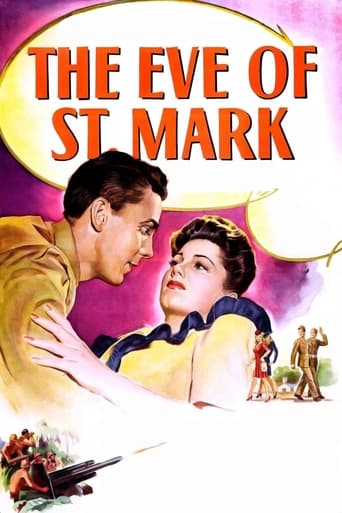MARIO GAUCI
A good war drama adapted by George Seaton from a literate Maxwell Anderson play is given the typical Fox polish and an experienced director to counter a cast peppered with new young talent (notably Anne Baxter, William Eythe, Michael O'Shea, Henry Morgan and Vincent Price).Of course, the film was intended as a morale-booster but, thankfully, the propaganda element (usually abetted by racist jibes) is kept at bay here; on the contrary, it strives to depict the characters as normal human beings who are thrust into extraordinary and often painful situations. Still, the expected doses of comedy (supplied by O'Shea) and romance (not only does country-boy Eythe become engaged to neighbor Baxter, but the whole gang gets to entertain a couple of lonely bar-room girls once in uniform) are present and accounted for; incidentally, it is odd seeing Price (looking quite youthful and serving as the butt of his buddies' jokes for his cerebral superiority being offset by perennial pennilessness!) amid this environment.The last act involves the war action proper, and even this is largely taken up by two of the men (Price included)'s bouts with malaria; the finale, then, sees the squad who had been cornered in a cave effect a fortuitous escape by sea (apparently, the ending of the original play was more downbeat)…followed by the voluntary conscription of Eythe's younger brother. By the way, the title is a reference to an obscure Catholic feast where, it is said, that one can see the figures of those about to die upon entering a church(!) – hence making for an ideal wartime metaphor.
JoeytheBrit
The stage play origins of this badly-dated wartime propaganda film are plain to see - or hear. People talk endlessly, and for the main part the aim seems to be to show just how ordinary their characters are. That's all very laudable, but it doesn't exactly make for riveting cinema.William Eythe, one of Hollywood's blandest leading men - whose faltering career would drive him to alcoholic despair and an early grave - fails to grab our attention or empathy as a farm boy who finds himself battling with the Japs on some Philippine island. Although he's listed as the leading man, the status is nominal, and he finds himself struggling to stand out amongst an ensemble cast that includes the likes of Harry Morgan and Vincent Price. Morgan is the voice of doubt in the unit, who looks to the past when forming an opinion instead of acting for the future of the next generation; Price is an impoverished Southern aristocrat type, given to quoting Shakespeare at the drop of a hat; it's an eye-catching performance, although not, perhaps, for the right reasons. His southern accent is so weak it barely manages to crawl from his mouth before tripping from his lips with a dull thud.The story plays second fiddle to the morale-boosting philosophising of its characters, and too much talk means the pace drags badly. In the final reel, the propaganda is ladled on like a thick creamy soup with characters speaking lines that must have had the audience squirming even back then. Essentially, the final message is a call to the parents of the nation to pass the baton to the next generation and allow all their fuzzy-cheeked boys to place themselves in the firing line.
writers_reign
There's something nicely symmetrical in the fact that this movie was adapted from a play by Maxwell Anderson. Almost forgotten today Anderson began his career with the Broadway hit play What Price Glory (co-written with Lawrence Stallings). Produced in 1924 and twice filmed it was, of course, set in World War One and was a comedy about the love-hate relationship between Flagg and Quirt, sergeant and private. Twenty years on Anderson was more philosophical as perhaps befits someone with a penchant for writing in blank verse. He also turned his hand to writing lyrics and collaborated twice with composer Kurt Weill on Knickerbocker Holiday and Lost In The Stars, neither exactly laff riots though the former did produce the evergreen September Song. By 1944 the was was definitely swinging in the favour of the Allies but this didn't guarantee that no blood was spilled. Farmboy William Eythe is the main protagonist but both his family, sweetheart, and his platoon get plenty of screen time and equit themselves well, not least Ray Collins, usually a belligerent banker/politician but here subdued as Eythe's farmer father. Ann Baxter may be wasted as Eythe's girl back home but there is a nice ensemble feel to the whole thing. Dated, perhaps, but still worth a look.
prd18
Can't admit to seeing all of this yet but caught several scenes on Film4 recently, while dashing in and out and having lunch. Brief as the glimpses were, I was captivated by the performances of the cast, especially Vincent Price (looking almost cherubic - light years from the characters that were to become his 'trade-mark') and Harry Morgan. Didn't actually 'know' any of the rest of the cast but the whole production seemed well crafted and not at all preachy or over the top. Wholly agree with other reviewers, not seen enough and just as deserving as many another war film. Definitely to be added to my "Must see" list!


